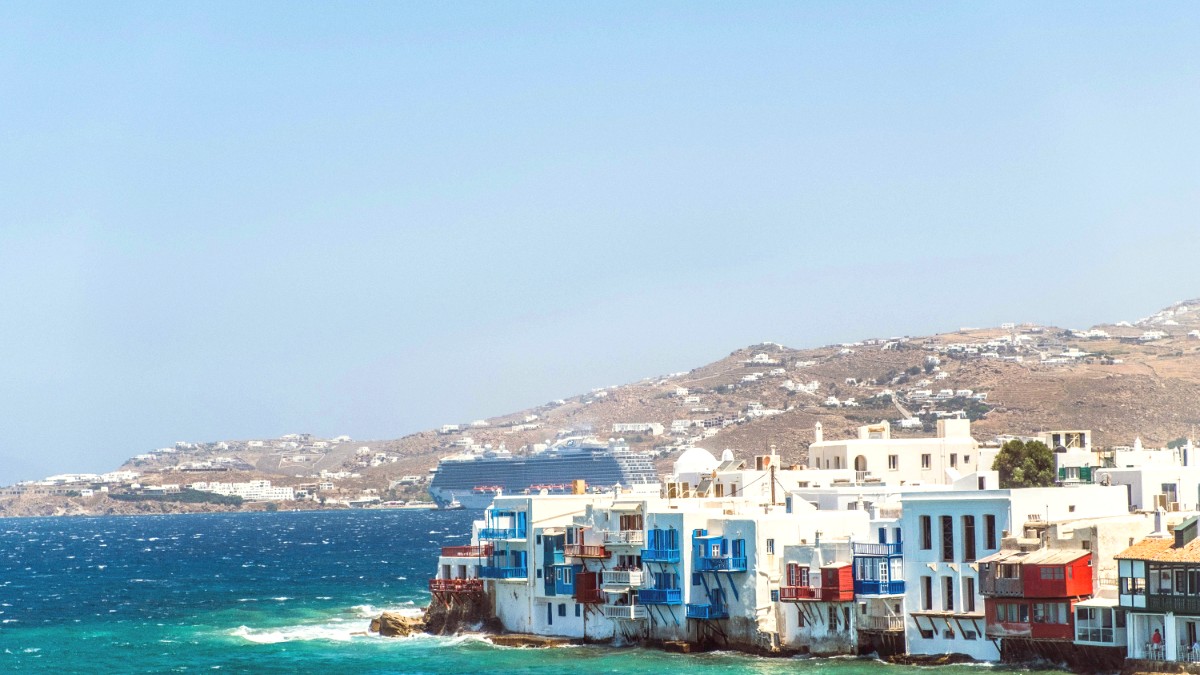
Cyclades, Greece
Mykonos has a Mediterranean climate, characterized by distinct seasons that shape the island's atmosphere and activities.
Mykonos enjoys plenty of sunshine throughout the year. The island's climate features hot, dry summers and mild, wet winters. Rainfall is extremely low in summer, with most days sunny in shoulder seasons. Winter has the highest rainfall.
Humidity is generally low to moderate, keeping summer heat comfortable. The Meltemi wind, common in July and August, sometimes continues into September, influencing ferry schedules or outdoor dining on exposed terraces.
Each season in Mykonos offers distinct advantages and disadvantages, depending on your travel preferences.
Mid-June to August
Hottest weather, all businesses open, warmest sea temperatures.
Most crowded, highest prices. Strong Meltemi winds are possible.
April-May & Sep-Oct
Pleasant temperatures, fewer crowds, lower prices. Still sunny; sea warm for swimming.
Some businesses might be closed in early April/late October.
November to March
Few tourists, authentic local experience, lowest prices.
Many businesses closed. Cooler, rainy weather. Nightlife absent.
Match your visit to your interests for the best Mykonos experience.
Beach & Swimming: June to September. Sightseeing & Walking: April, May, late September, and October. Nightlife & Parties: July and August for peak season. Budget Travel: May, early June, or September. Windsurfing & Kitesurfing: July and August for strong Meltemi winds.
June-September for warmest waters and beach activities.
April-May & Sep-Oct for comfortable sightseeing.
July-August for all major clubs and events.
May, early June, or September for lower costs.
July-August for strong Meltemi winds, ideal for surfing.
Greece is part of the Schengen Area, which makes travel easier for many nationalities but has specific visa policies for others. Understand the requirements before your trip.
Citizens of many non-EU/EEA countries (e.g., India, China, South Africa) need a Schengen visa for stays up to 90 days within any 180-day period. This visa covers travel to all Schengen member states.
Carry all necessary documents, both original and copies, for smooth entry.
Mykonos is often an expensive destination, especially during high season. Plan your budget carefully based on your travel style to avoid surprises.
A trip to Mykonos calls for thinking about a few practical health and safety aspects. This section covers details to keep you well and secure.
Ensure MMR, DTP, and Polio are current. CDC suggests Hepatitis A and B, and Tetanus for most travelers.
Use high SPF Sunscreen, wear hats & sunglasses. Seek shade 12 PM - 4 PM. Stay hydrated.
Use Insect repellent (DEET/picaridin). Wear long sleeves/pants in evenings.
Mykonos has medical facilities, though serious conditions may lead to transfer to an Athens hospital. Mykonos Health Center (Public) in Mykonos Town provides basic emergency care (24/7).
Private medical centers and individual doctors operate on the island, often with faster service and English-speaking staff, but at a higher cost. Pharmacies (Farmakeia), recognizable by a green cross, are widely available and give advice for minor ailments; many medications without prescription.
For emergencies, dial 112 (European emergency number) for police, ambulance, or fire services. Clearly state your location and the nature of the emergency.
Before your trip, consult a travel health professional for personal vaccination needs and health precautions.
Tap water in Mykonos is generally safe. Many prefer Bottled water for taste (desalination plants impart mineral content/chlorine). A Water filter bottle is good for convenience.
Standards are generally high. Eat at busy establishments (high turnover indicates freshness). Confirm seafood freshness. Avoid unhygienic street food.
Drink Water regularly. Avoid excessive alcohol consumption, which contributes to dehydration, especially in the heat.
Mykonos has a low crime rate and is generally safe. Petty theft occurs in crowded areas (Mykonos Town, beach clubs, nightlife).
Keep these numbers accessible, both digitally and as a physical copy:
112 (Connects to Police, Ambulance, Fire Department)
22890 23994
22890 22716